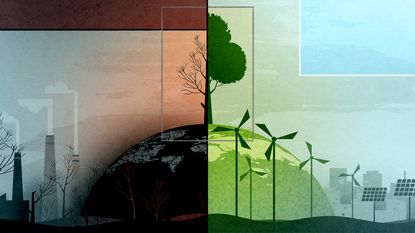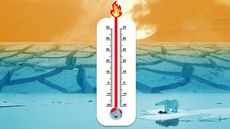The most and least environmentally friendly countries of 2023
Which nations are making strides, and which are missing the mark?


The climate crisis has become one of the most pressing issues facing the world today as the effects and damages become more apparent. The U.N. signed the Paris Agreement pledging carbon neutrality by 2050; however, some countries are playing a bigger part in reducing emissions than others.
Experts use many measures to evaluate a country’s impact on the environment including the Environmental Performance Index (EPI), which uses 40 indicators to rank the level of sustainability for 180 countries, U.S. News’ Green Living Ranking, the Green Future Index (GFI), which focuses on countries’ transitions to clean energy and the UN Sustainable Development Report, which tracks important goals encompassing climate, environment, and human rights. Through these metrics, some countries have made bigger strides to be more environmentally friendly, while others haven’t.
Top 3 most sustainable countries
Sweden
Sweden ranked high in all the metrics, coming in fifth in the EPI, first in the Green Living Ranking and fifth in the GFI. The country has long been a pioneer in environmentalism, regularly ranking high in these categories. Approximately 60% of Sweden’s energy comes from renewable sources and it has “set ambitious goals for sustainability, including going fossil-free by 2045 and 100% renewable energy,” according to the country’s website.
Subscribe to The Week
Escape your echo chamber. Get the facts behind the news, plus analysis from multiple perspectives.

Sign up for The Week's Free Newsletters
From our morning news briefing to a weekly Good News Newsletter, get the best of The Week delivered directly to your inbox.
From our morning news briefing to a weekly Good News Newsletter, get the best of The Week delivered directly to your inbox.
The country also ranked second in the Sustainable Development Report. “Swedish policy is increasingly influenced not by a focus on biodiversity … but instead on the multi-functionality of land,” the European Commission explained. The country focuses on “the potential to conserve biodiversity on land that is not primarily used for this purpose.”
Denmark
Denmark was the highest-ranked nation in the EPI, fifth in the Green Living Ranking and fourth in the GFI. The country has also spent a lot of time in the top ranks of sustainability. Denmark has a small carbon footprint and is ranked third in the Sustainable Development Report. In 2020, Denmark passed the Climate Act, which set a goal of cutting emissions by 50% by 2025 and 70% by 2030.
The country has also implemented newer ways of increasing sustainability including proposing a passenger tax on air travel to be used to help the industry transition to green energy. “The aviation sector in Denmark must — just like all other industries — reduce its climate footprint and move towards a green future,” said Lars Aagaard, Denmark’s Minister for Climate, Energy and Utilities. The Danish government is also working with Japan on offshore wind projects.
Finland
Finland ranked third place in the EPI, sixth in the Green Living Ranking and second in the GFI. It also ranked first in the Sustainable Development Report, meaning Scandinavia has continued to dominate the sustainability space. The country is also dedicated to carbon neutrality, opting for an 80-95% reduction in greenhouse gas emissions by 2050. Finland is also almost 70% forested, with about 17,000 square kilometers strictly protected.
The country has made substantial strides in offshore wind development. ”The development of five new offshore wind farms proves that Finland is fully committed to increasing the capacity of emission-free energy,” said Juha S. Niemelä, Director General of Finnish government-owned environmental organization Metsähallitus. “This, in turn, enables large-scale investments in green transition.”
Top 3 least sustainable countries
Qatar
Qatar ranked 137th in the EPI, 27th in the Green Living Ranking, 100th in the Sustainable Development Report and 73rd on the GFI. The country also has the most per capita carbon emissions globally. Qatar is one of the largest exporters of oil and natural gas and its domestic production accounts for almost all of its energy needs. As a member of the Organization of Petroleum Exporting Countries (OPEC), fossil fuels are a staple of the Qatari economy.
Qatar was caught in controversy last year for its handling of the FIFA World Cup. Experts cited human rights violations in building the stadiums as well as a false claim of carbon neutrality. Despite the reports, a spokesperson for Qatar’s Supreme Committee for Delivery & Legacy claimed to BBC Sport that “no other country has engaged so deeply with its citizens to ensure a sustainable legacy is left behind after a FIFA World Cup."
Iran
Iran ranked 133rd in the EPI, 87th in the Green Living Ranking, 86th in the Sustainable Development Report and 76th in the GFI. The country also heavily relies on oil and gas exports for its economy. The country is the sixth-highest greenhouse gas emitter in the world and is one of the only countries to not ratify the Paris Agreement. Iran’s decision-makers “have shown no willingness towards greenhouse gas mitigation efforts,” Al Jazeera reported.
The country has also faced a number of controversies from global protests in support of women’s rights to the debate surrounding its place in the Israel-Hamas war. Iran is also facing a water crisis as the country “has disastrously mismanaged Iran’s water resources in the decades since the 1979 revolution,” Time explained.
Turkey
Turkey ranked 172nd in the EPI, 45th in the Green Living Ranking, 72nd in the Sustainable Development Report and 63rd in the GFI. In the country, “environmental issues have often been overshadowed by more immediate concerns, such as economic stability, political conflicts, refugee crises and recent earthquake relief efforts,” according to the Stockholm Environment Institute. Turkey relies heavily on energy imports, racking up its carbon footprint. Waste management is also a large problem for the nation, ranking at “the top of the list of the least environmentally friendly waste management country” in the 2022 Global Waste Index.
However, the country is making strides to improve its situation and has already made significant progress. “As a middle-income country, Turkey has made progress in all three dimensions of sustainable development and taken fundamental steps in eradicating poverty, reducing inequalities and addressing the vulnerable,” said the United Nations.
Where does the U.S. rank?
The U.S. ranked 43rd in the EPI, 20th in the Green Living Ranking, 29th in the Sustainable Development Report and 19th in the GFI, which is lower than some may have anticipated compared to other developed nations.
The U.S. is the second largest greenhouse gas emitter in the world, accounting for more than 13% of total global emissions. The U.S. also still heavily relies on fossil fuels, which causes considerable damage. President Joe Biden faced criticism for his approval of the Willow Project, a massive oil drilling endeavor. While the U.S. has made strides to reduce the environmental damage it causes, like passing the Inflation Reduction Act, more can be done politically to actively combat climate change, as the country is one of the planet's largest contributors.
Are there any patterns in the data?
The rankings show that just as climate change disproportionately impacts some regions, the ability to improve or prevent it is also disproportionate. Almost all of the top-ranked countries on every list are smaller European countries, which have fewer problems with resources and more money to invest in green legislation.
On the other hand, the bottom largely includes developing nations that are predominantly made up of people of color or countries that heavily rely on fossil fuels for their economy, and many have far higher populations than their European counterparts.
This is all the more reason that countries capable of making change more easily should make greater strides to do so, for the good of the world at large.

Continue reading for free
We hope you're enjoying The Week's refreshingly open-minded journalism.
Subscribed to The Week? Register your account with the same email as your subscription.
Sign up to our 10 Things You Need to Know Today newsletter
A free daily digest of the biggest news stories of the day - and the best features from our website
Devika Rao has worked as a staff writer at The Week since 2022, covering science, the environment, climate and business. She previously worked as a policy associate for a nonprofit organization advocating for environmental action from a business perspective.
-
 5 X-plosive cartoons about Elon Musk
5 X-plosive cartoons about Elon MuskCartoons Artists take on his proposed clean-up of X, his views on advertisers, and more
By The Week US Published
-
 2023: the year of superhero fatigue
2023: the year of superhero fatigueThe Explainer The year may represent the end of an era for Hollywood
By Brendan Morrow, The Week US Published
-
 Recipe: roast garlic mushrooms with parsley and eggs by Gelf Alderson
Recipe: roast garlic mushrooms with parsley and eggs by Gelf AldersonThe Week Recommends A simple and classic breakfast combination
By The Week UK Published
-
 The biggest climate records hit this year
The biggest climate records hit this yearIn Depth The sheer number of climate records made in 2023 presents a harrowing warning of the destructiveness of climate change
By Devika Rao, The Week US Published
-
 The extreme weather events of 2023
The extreme weather events of 2023In Depth Extreme weather events are becoming more common thanks to climate change, and are 'affecting every corner of the world'
By Devika Rao, The Week US Published
-
 12 recent scientific breakthroughs
12 recent scientific breakthroughsIn Depth From photos of the infant universe to an energy advancement that could save the planet
By Devika Rao, The Week US Published
-
 What is NASA working on?
What is NASA working on?In Depth A running list of the space agency's most exciting developments
By Devika Rao, The Week US Published
-
 Cigarette-style warning labels on meat could cut consumption, say scientists
Cigarette-style warning labels on meat could cut consumption, say scientistsSpeed Read The UK's national food strategy aims to cut meat consumption by 30% by 2032
By Sorcha Bradley, The Week UK Published
-
 Humans are polluting the upper atmosphere with flaming space junk
Humans are polluting the upper atmosphere with flaming space junkSpeed Read Experts are still unsure of the effects
By Devika Rao, The Week US Published
-
 Why scientists think orcas may be getting smarter
Why scientists think orcas may be getting smarterUnder the Radar Changing ocean conditions may be forcing killer whales to learn new survival skills
By The Week Staff Published
-
 Get to know the 2023 Nobel Prize winners
Get to know the 2023 Nobel Prize winnersIn Depth A look at the men and women behind the groundbreaking work honored this year
By Devika Rao Published










